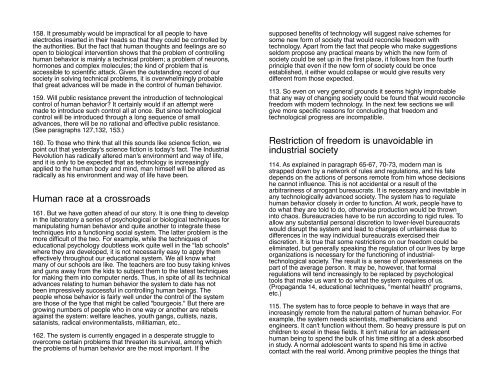Unabomber Manifesto - ouroboros ponderosa
Unabomber Manifesto - ouroboros ponderosa
Unabomber Manifesto - ouroboros ponderosa
You also want an ePaper? Increase the reach of your titles
YUMPU automatically turns print PDFs into web optimized ePapers that Google loves.
158. It presumably would be impractical for all people to haveelectrodes inserted in their heads so that they could be controlled bythe authorities. But the fact that human thoughts and feelings are soopen to biological intervention shows that the problem of controllinghuman behavior is mainly a technical problem; a problem of neurons,hormones and complex molecules; the kind of problem that isaccessible to scientific attack. Given the outstanding record of oursociety in solving technical problems, it is overwhelmingly probablethat great advances will be made in the control of human behavior.159. Will public resistance prevent the introduction of technologicalcontrol of human behavior? It certainly would if an attempt weremade to introduce such control all at once. But since technologicalcontrol will be introduced through a long sequence of smalladvances, there will be no rational and effective public resistance.(See paragraphs 127,132, 153.)160. To those who think that all this sounds like science fiction, wepoint out that yesterday's science fiction is today's fact. The IndustrialRevolution has radically altered man's environment and way of life,and it is only to be expected that as technology is increasinglyapplied to the human body and mind, man himself will be altered asradically as his environment and way of life have been.Human race at a crossroads161. But we have gotten ahead of our story. It is one thing to developin the laboratory a series of psychological or biological techniques formanipulating human behavior and quite another to integrate thesetechniques into a functioning social system. The latter problem is themore difficult of the two. For example, while the techniques ofeducational psychology doubtless work quite well in the "lab schools"where they are developed, it is not necessarily easy to apply themeffectively throughout our educational system. We all know whatmany of our schools are like. The teachers are too busy taking knivesand guns away from the kids to subject them to the latest techniquesfor making them into computer nerds. Thus, in spite of all its technicaladvances relating to human behavior the system to date has notbeen impressively successful in controlling human beings. Thepeople whose behavior is fairly well under the control of the systemare those of the type that might be called "bourgeois." But there aregrowing numbers of people who in one way or another are rebelsagainst the system: welfare leaches, youth gangs, cultists, nazis,satanists, radical environmentalists, militiaman, etc..162. The system is currently engaged in a desperate struggle toovercome certain problems that threaten its survival, among whichthe problems of human behavior are the most important. If thesupposed benefits of technology will suggest naive schemes forsome new form of society that would reconcile freedom withtechnology. Apart from the fact that people who make suggestionsseldom propose any practical means by which the new form ofsociety could be set up in the first place, it follows from the fourthprinciple that even if the new form of society could be onceestablished, it either would collapse or would give results verydifferent from those expected.113. So even on very general grounds it seems highly improbablethat any way of changing society could be found that would reconcilefreedom with modern technology. In the next few sections we willgive more specific reasons for concluding that freedom andtechnological progress are incompatible.Restriction of freedom is unavoidable inindustrial society114. As explained in paragraph 65-67, 70-73, modern man isstrapped down by a network of rules and regulations, and his fatedepends on the actions of persons remote from him whose decisionshe cannot influence. This is not accidental or a result of thearbitrariness of arrogant bureaucrats. It is necessary and inevitable inany technologically advanced society. The system has to regulatehuman behavior closely in order to function. At work, people have todo what they are told to do, otherwise production would be throwninto chaos. Bureaucracies have to be run according to rigid rules. Toallow any substantial personal discretion to lower-level bureaucratswould disrupt the system and lead to charges of unfairness due todifferences in the way individual bureaucrats exercised theirdiscretion. It is true that some restrictions on our freedom could beeliminated, but generally speaking the regulation of our lives by largeorganizations is necessary for the functioning of industrialtechnologicalsociety. The result is a sense of powerlessness on thepart of the average person. It may be, however, that formalregulations will tend increasingly to be replaced by psychologicaltools that make us want to do what the system requires of us.(Propaganda 14, educational techniques, "mental health" programs,etc.)115. The system has to force people to behave in ways that areincreasingly remote from the natural pattern of human behavior. Forexample, the system needs scientists, mathematicians andengineers. It can't function without them. So heavy pressure is put onchildren to excel in these fields. It isn't natural for an adolescenthuman being to spend the bulk of his time sitting at a desk absorbedin study. A normal adolescent wants to spend his time in activecontact with the real world. Among primitive peoples the things that






